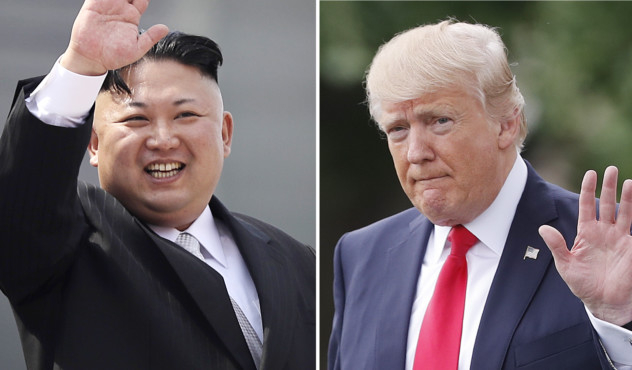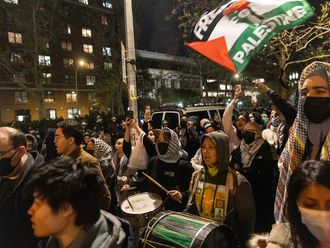
Trump's tough talk about North Korea might actually end the crisis
SHANGHAI - In North Korea, the United States is closer to nuclear war than at any other time since the Cold War. An aircraft carrier battle group (after some confusion) is steaming in. Kim Jong Un vows a sixth nuclear test, which the United States has said it would not tolerate. "Diplomatic efforts," Secretary of State Rex Tillerson said, "have failed." Heated words are exchanged almost daily between the world's only superpower and its small and impoverished, but nuclear-armed, antagonist. If posturing tips over into actual violence, 1 million people could die on the Korean Peninsula alone - that is, if the conflict doesn't go nuclear. Pyongyang's missiles are not able to reach the United States, but Japan is well within range.
At the same time, these two nations may also be closer to peace than at any point in nearly two decades. This is because the United States appears to be shifting away from a policy that exacerbated the conflict. Under the administrations of George W. Bush and Barack Obama, the United States mixed two fundamentally conflicting aims in its dealings with North Korea, writes Fu Ying, who led the Chinese delegation in many of the failed multilateral Korean nuclear talks, in a recent paper for the Brookings Institution. That's because Washington aimed for both denuclearization and regime change. The first goal is strategic, and the second is largely ideological. But the threat of regime change is the very reason the regime wants a nuclear deterrent.
There are signs that President Trump may take American policy beyond this strategic-ideological schizophrenia. This past week, Tillerson said the United States needs to separate its values from its policies. For the sake of national and regional security, curtailing Pyongyang's weapons program is clearly the higher priority.
Two misperceptions have resulted in a confused policy toward North Korea. First is the notion that it has been a client state of China since the end of the Korean War, driven by an ideological alliance between the two communist countries and China's need for a buffer between it and U.S.-allied South Korea. In the Financial Times, for instance, James Kynge wrote , "Beijing remains inclined to tolerate its exasperating client state." But for much of the Cold War, North Korea was a client state of the Soviet Union, not of China. The Soviets provided virtually all of the economic and military aid to North Korea, including its initial nuclear capability. During much of the same period, China was in a quasi-alliance with the United States against the Soviet Union.
After the fall of the U.S.S.R., North Korea's founding leader, Kim Il Sung, the grandfather of Kim Jong Un, went to China in 1991 and met with China's leader, Deng Xiaoping. He entreated his neighbor to take over the leadership of the communist world and assume patronage of his country. Deng rejected the pleas. His famous words "Tao guang yang hui" ("Keep a low profile"), China's foreign policy doctrine for the following decades, were uttered for the first time in front of the elder Kim during that meeting. China, however, did provide - and still does - just enough material support to help a close neighbor; Beijing dislikes the idea of instability on its northeastern border that might result from a state collapse. But the notion of a client state based on an ideological bond is simply wrong. China does have some leverage, but it does not, as Trump has said , hold the key to controlling North Korea.
The second misperception is that it's time for action, because marathon talks over many years failed to persuade North Korea to give up its nuclear weapons program. "Strategic patience has ended," Tillerson said. This radically oversimplifies the history of negotiations, both directly between the United States and North Korea and involving neighboring countries. Yes, negotiations failed. But they very nearly succeeded.
Two multi-year negotiation processes were carried out after the Cold War. Under the Clinton administration, the United States talked with North Korea directly, without China's involvement, and in 1994 signed the Agreed Framework on resolving the nuclear issue. The Bush administration engaged in several rounds of three-party talks and six-party talks, hosted by China at the request of the United States. Both negotiations were able to keep the nuclear situation under control for sustained periods of time and came tantalizingly close to resolving it. Toward the end of the Clinton administration, the situation had improved so much that President Bill Clinton seriously considered visiting North Korea.
There were several reasons they eventually all failed, among them lack of trust and delayed implementations by both sides. But the most decisive reason, as Fu argued in her essay, was America's conflicting goals of denuclearization and regime change. Former defense secretary William Perry said on a number of occasions that the North Koreans could not be developing nuclear weapons to use them, because that would be suicide. So they must have created them to ensure their own survival against a U.S. attack. Yet ever since Bush's "axis of evil" speech in 2002, Washington has been unwilling to forgo its ideological aim of regime change to realize denuclearization.
This conflict in U.S. aims was at the heart of the failure of the six-party talks and the tit-for-tat escalations between the two countries during the Obama administration. In fact, in the face of the existential threat posed by a superpower, North Korea has come to believe that nuclear weapons are its only protection. The fate of Moammar Gadhafi, who had given up Libya's nuclear weapons program in exchange for the lifting of American-led economic sanctions, is not lost on the North: Obama sided with Arab Spring insurgents after Gadhafi's violent crackdown on them, and the Libyan leader died on a desert highway, trying to escape the rebels.
America's conflicting goals have also complicated Beijing's position. Nuclear weapons in North Korea are against China's national security interests, for obvious reasons. But the collapse of the North Korean state as a result of regime change forced upon it from the outside would be equally catastrophic in China's eyes. A refugee influx would wreck havoc in its northeastern provinces, depressing labor prices and quality of life. And Korean reunification on U.S. and South Korean terms could result in American troops on its border, a situation Beijing would find intolerable in the long term.
So for China, denuclearization cannot be obtained by means of regime change. This position is based solely on security interests and has nothing to do with a client state or ideology. The United States has over the years leaned on China to exercise its leverage on North Korea. But previous negotiations ended in failure because what the North needs to give up its nuclear weapons - security - Beijing cannot give. Only Washington can give it.
Today, Trump seems to be freeing the United States from the neoconservative and liberal-interventionist policies of the past. For the first time in 16 years, the American side has come out and said rather unequivocally that the foremost priority is disarmament. "We do not seek regime change, we do not seek a collapse of the regime, we do not seek an accelerated reunification of the peninsula," Tillerson told NPR. "We seek a denuclearized Korean Peninsula." Now, the United States and China have a shared objective without substantive contradictions. Trump has even said that he would be "honored" to meet with Kim Jong Un under the right circumstances. This may be the crucial difference that could breathe new life into the possibility of a negotiated settlement.
In the end, the deal can only be that North Korea gives up its nuclear programs in exchange for assurances that it will not be attacked. Numerous uncertainties and risks would remain. How would we verify denuclearization? How could Pyongyang trust that Washington would honor a commitment not to pursue regime change later, as it did in Libya? Would China be willing to step in and fill the gap between the two parties' promises? Because of the long-running hostilities and absence of trust, provocations such as missile tests or even nuclear tests can set this goal back.
But the United States and China finally have a clear path - pressuring North Korea from their respective directions to first halt its nuclear program and then negotiate its rollback in exchange for the survival of the state. And the unprecedentedly close working relationship between Presidents Trump and Xi Jinping on the Korean nuclear issue (one bilateral summit and two telephone calls in the same month) can help keep it moving forward. With Trump's new approach, choosing one goal over the other, the United States may finally get what it wants.
- Li is a venture capitalist and political scientist in Shanghai.
Sign up for the Todays WorldView NewsletterThe Washington Post.
nkorea-comment










